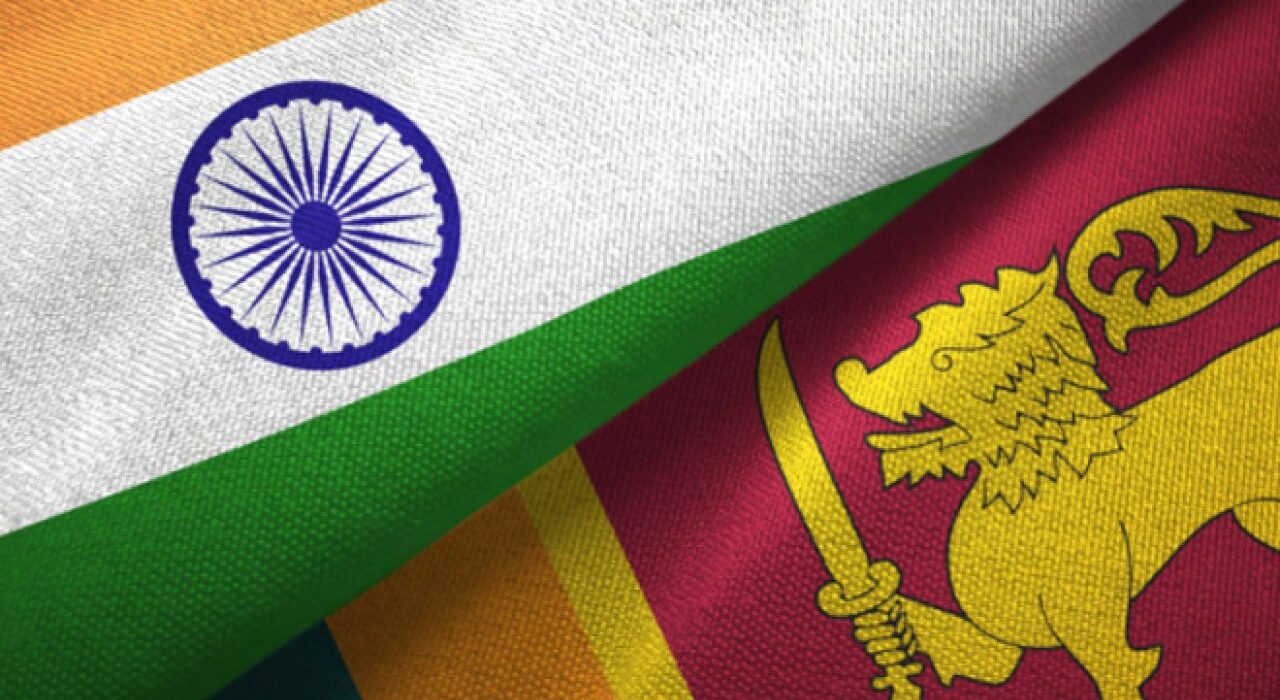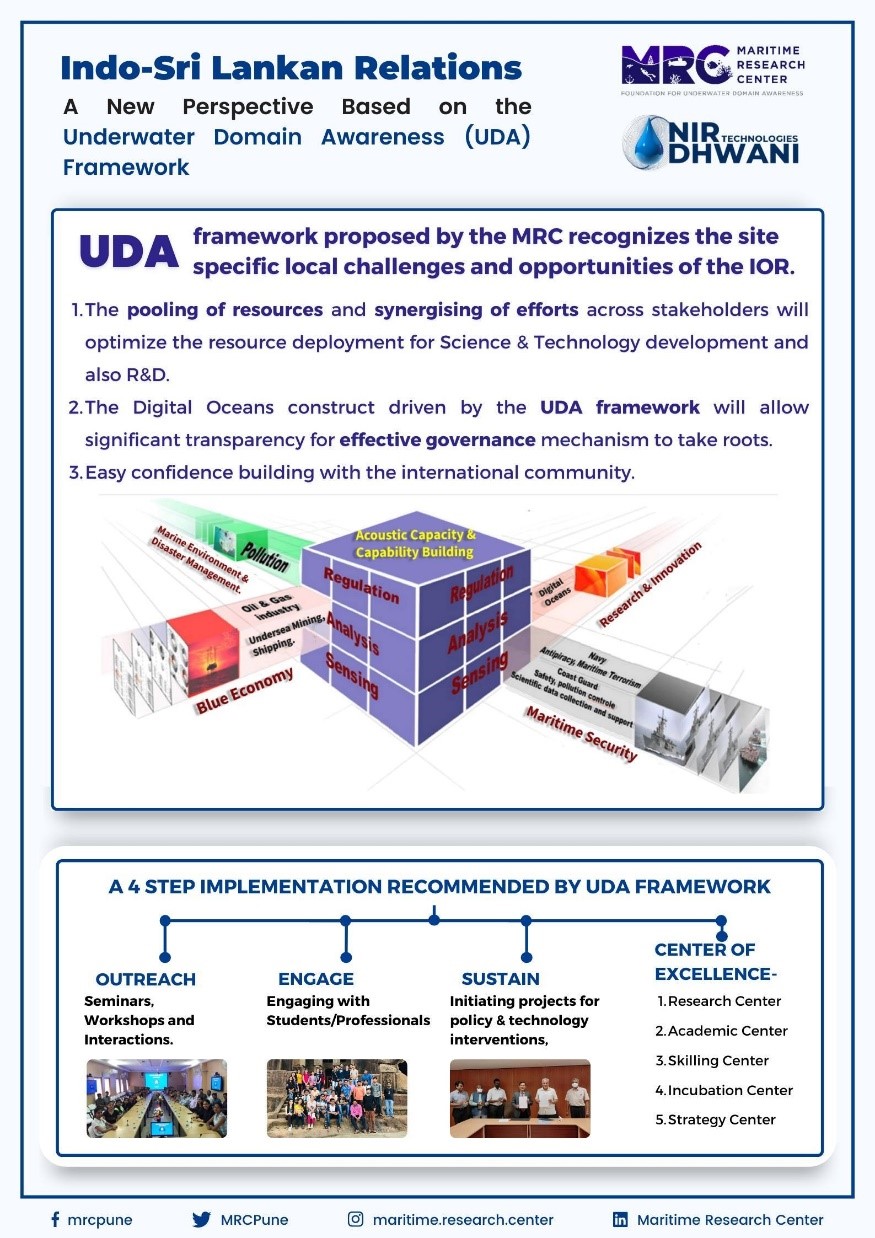Heading
The Island nation of Sri Lanka is going through the worst political and economic crisis, since its independence in 1948. The severe economic devastation, with shortage of food, energy, medicines and essentials has hit the common man on the streets. This has led to massive public anger and political unrest, with people demanding change of leadership. The crisis is blamed at multiple internal and external factors. The breakdown of governance mechanism does not need to be overstated. The reconstruction has to be multipronged, on one end the economic situation has to look up, but the communities also have to be seamlessly integrated into the inclusive development plan.
Sri Lanka, as part of the Indian sub-continent has a rich maritime heritage of a 5,000 years old civilization that has thrived and influenced many cultures across the globe. Maritime culture for an island nation, could be the indomitable asset. Blue economy in the tropical littoral water of the Indian Ocean Region (IOR), can have no match to prosperity. The central location of Sri Lanka in the IOR, makes it mandatory for them to have a mature blue economic policy. The major advantages are its location that allows access to the trade routes and accessibility to tropical ocean resources and also sovereignty over a significant area of sea, due to the long coastline. A diverse range of coastal & marine ecosystem around the Sri Lankan coast also gives advantage for tourism and marine industry. The flipside of the location is also vulnerability to political instability both at the domestic and regional level. The oceans around, are highly contested and makes it extremely attractive for the extra-regional powers to keep a hawk’s eye, both on the internal and external activities.
The global community is pushing for sustainable blue economy on multiple fronts. The sustainable blue economy for an island nation like Sri Lanka, will facilitate conservation and development. It will encourage varied economic activities for inclusive growth, such as ocean-based renewable energy, fisheries, aquaculture, mari-culture, maritime transport, tourism and water management. To get integrated to the global community and the international systems, Sri Lanka has to take steps to meet global norms.
The blue economic push also aligns directly with the Sustainable Development Goals as well as the UN Decade of Ocean Science for Sustainable Development and the UN Decade on Ecosystem Restoration, both of which started in 2021. Furthermore, Sri Lanka is part of the Commonwealth Blue Charter and a member of the Indian Ocean Rim Association, which has a blue economy priority focus area. The biggest challenge faced by such announcements is the capacity and capability building. Specialized and skilled human resource is not easy to come by. Too much dependence on outside help, comes with strings attached.
APY Analysis Tool for Management of Living Resources: The APY (Area under cultivation, productivity and yield) analysis is an effective tool used in agriculture to ensure efficiency and effectiveness of interventions. The same can be used in the underwater domain to manage the living resources in a sustainable and optimal manner. The environmental parameters that impact the growth and wellbeing of these living resources can be fed into a Science & Technology (S&T) backed tool to generate the entire Modelling & Simulation (M&S) structure. This tool will allow a deeper understanding and seamless management of the activities related to the underwater domain. These activities will include aquaculture, fisheries, mari-culture, bio-energy and more. Such tools will allow timely interventions at multiple levels to effectively manage these activities. The communities will benefit, not just in terms of their operational management and enhancing the efficiency of their practices, but also in bringing down the uncertainty in their outputs. Such maturity in their practices will allow financial institutions to also get involved and bring more investments and financing models to these activities. Even the marine spatial planning will be better managed with such tools and the coastal and riverine communities will get better returns for their land holdings and livelihood practices. Sustainable Development Goal, SDG-14 that involves life below water is better served with tools like these.
Underwater Radiated Noise Management Tool: Sri Lanka is strategically located next to the most important Sea Lane. The global trade passes through these sea lanes, ensuring energy security to the growing economies of South East Asia and on the return leg, it carries the finished goods to the markets in the west. The underwater radiated noise from the shipping traffic is the single ubiquitous source of low frequency ambient noise. Low frequency ambient noise below 1 kHz, interferes with multiple biologically critical functions for numerous marine mammal species. The marine mammals use sound for navigation, communication, foraging, breeding and more. So Acoustic Habitat Degradation is a serious threat to the sustainability of the local ecosystem. The International Maritime Organization (IMO) has already taken note of the hazards of URN and is pushing for regulatory norms.
Climate Change & Disaster Management Centre: The growing blue economic push in the oceans and also multiple other anthropogenic interventions with nature is ensuring large scale natural disasters originating from the oceans. The climate change concerns need no emphasis and the global community is worried about the lack of understanding and scientific data to manage these challenges. Sri Lanka with its location is ideally placed to take the lead in climate change and disaster management research, by setting up a Centre of Excellence (CoE). Such an initiative, will not only serve the global cause, but also allow capacity & capability building in Sri Lanka for the much required Digital Oceans construct, with the heavy lifting being done by the global agencies. Multiple SDGs are served with such initiatives.
Tropical Littoral Challenges: The tropical littoral waters present a very unique characteristics, in terms of the sub-optimal sonar performance. Any UDA effort will require sonar deployment across any application. The technology imported from the west gets degraded by upto 70%, when deployed in the IOR. Indigenous efforts to develop S&T and site specific R&D to overcome the tropical littoral challenges is mandatory. The traditional knowledge is the store house of wealth and needs to be revived. The S&T and R&D efforts should work towards strengthening the traditional knowledge rather than replacing them. Underwater Archaeology deserves far more attention, particularly for an Indian Civilization that has survived over 5000 years, with glory. Blindly following the western ways will make us rootless and destroy our existence.
The outreach will be through seminars, workshops and interactions across the stakeholders, policy makers, practitioners and general public to sensitize them on the relevance and applications. The second step post sensitizing will be to engage with the students and young professionals at one level by encouraging & supporting them through fellowships. On the other level by signing MoUs for bringing diverse stakeholders and decision makers on-board. Sustaining the program will translate to initiating projects for policy & technology interventions, funded by the government and the corporates. Acoustic capacity and capability building in the tropical littoral waters will require setting up a CoE. The CoE will comprise of five sub-centres, namely the research centre to support multi-disciplinary research, then an academic centre to provide multilevel degree courses, along with a skilling centre to train the masses to contribute to this larger cause. The forth and the most important will be the incubation centre to manage the innovation required to progress such a complex initiative. The last but not the least will be the policy or strategy centre that will formulate the framework to manage such an ambitious program.

Dr (Cdr) Arnab Das
About Author
Director and Founder of MRC, Pune. Dr Das is an ex Naval officer with 2 decades of active services and PhD holder from IIT Delhi with specialization in Underwater Acoustics. He has worked on several projects and has a plethora of publications to his credit.




